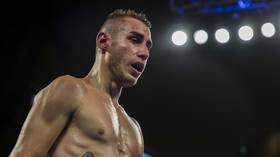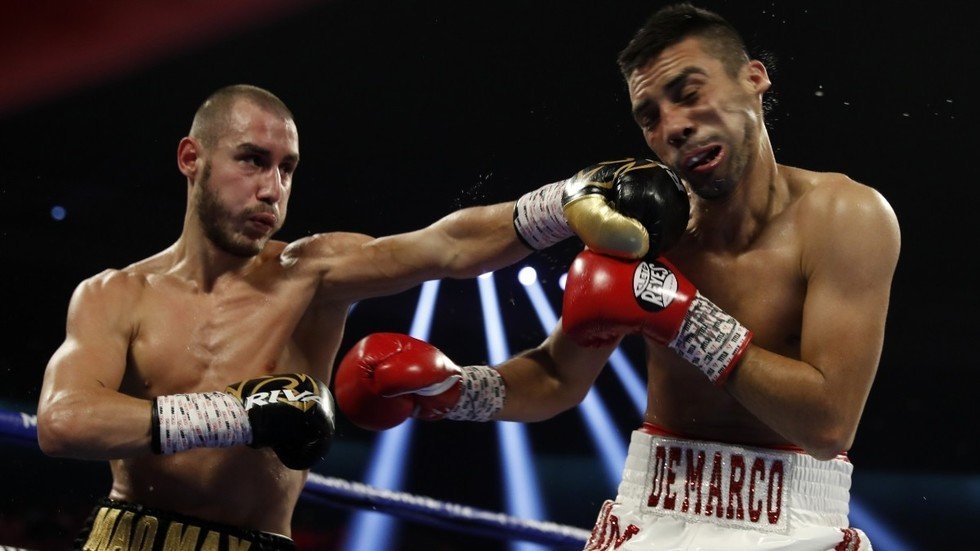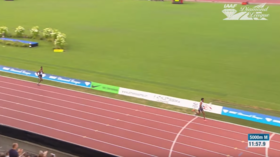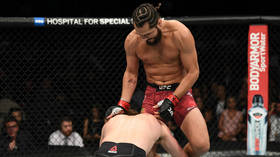Maxim Dadashev's tragic death should be accepted as boxing's cruel reality

Wiley boxing trainer James ‘Buddy’ McGirt has seen a lot in boxing - although it took the tragic death of his fighter Maxim Dadashev to make the veteran realize just how unpredictable and unforgiving the sport can be.
It was McGirt who pleaded with Dadashev, out of respect for the young fighter’s pride, to pull him out of his fight against undefeated Puerto Rican Subriel Matias after suffering a particularly vicious onslaught in the 11th round on Friday.
Begging in the corner, McGirt implored the 28-year-old Russian: “I’m gonna stop this. Max, you’re getting hit too much. Please Max, please let me do this ok. If I don’t, they’re gonna do it. Please, please, Max!”
Buddy McGirt, one of the most emotionally intelligent trainers, has always been exceptional with these kind of calls in boxing.Tragically, even he couldn't save Maxim Dadashev, no matter how much he begged and pleaded. RIP.pic.twitter.com/2NqFKFZCYp
— Danny Armstrong (@DannyWArmstrong) July 23, 2019
In reality, McGirt’s mind had been made up some time before; Dadashev had appeared unsteady on his legs, his body had been shunted around the ring with every vicious body-head combo.
McGirt made the decision to save the boxer to fight another day. That Dadashev would never see that day, no one could have foreseen. The warning signs were not even clear to McGirt.
“It just makes you realize what type of sport we’re in, man,” a distraught McGirt told ESPN following the news of Dadashev's passing from his injuries sustained in the fight.
Aside from its obvious heartbreaking result, the most alarming fact about Dadashev’s death is no one clear punch, nor one precise moment can be pinpointed as the breaking point. Dadashev had not been knocked down or significantly wobbled.
Anything falling short of the aforementioned would not unreasonably be deemed premature for the referee to call a halt to proceedings. Besides that, an unwritten warrior’s code dictates a fighter must battle through any harsh predicament - to give up when the going gets tough goes some way against the nature of the sport.
Also on rt.com Russian boxer Dadashev, who suffered 'severe brain damage' after TKO loss, dies of his injuriesThe accumulation of punishment essentially became too much, and broke Dadashev physically, although mentally he was not ready to admit it.
McGirt’s 80-fight pro career yielded two world titles in two different weight classes, a wealth of experience he then took into training, polishing rough diamonds into world class fighters in their corner, and Dadashev was his latest protege.
The two had formed a bond when Dadashev, after a glittering amateur career, moved from Russia and based himself in Oxnard, the boxing hotbed nestled into the Californian South Coast, to begin his first steps on the unforgiving road to a world title.
It was a long way from Russia but Dadashev adapted, joined up with McGirt, and rattled off quick wins against limited opposition. His career gained momentum and soon the class of opposition rose. Eventually he met former world champions Darleys Perez and Antonio DeMarco - beating both convincingly.

Those wins served as a graduation for Dadashev, and his profile rose accordingly. He was deemed competent enough to warrant a shot at a tile eliminator - and a match against fellow 13-0 contender Subriel Matias was deemed a fair matchup.
Everything in the lead-up seemed to go to plan, without any red flags that signaled Dadashev could be out of his depth.
“He did everything right in training, no problems, no nothing. My mind is like really running crazy, right now. Like what could I have done differently? But at the end of the day, everything was fine," McGirt said.
“He seemed OK, he was ready, but it’s the sport that we’re in. It just takes one punch, man. I saw him fading and when he came back to the corner (after the 11th round), my mind was already made up. I was just asking him out of respect, but my mind was made up. I wasn’t going to let him go out there.”
For another of McGirt’s former students, current light heavyweight world titlist Sergey Kovalev, the situation that unfolded on Friday is all too relatable. A compatriot of Dadashev, Kovalev had also moved to the US to begin his pro career.
The Top Rank family mourns the passing of Maxim Dadashev. Maxim was a talented fighter inside the ring and a loving husband and father outside the ropes. Our thoughts and prayers are with his family and friends. pic.twitter.com/bTVO0xcWhN
— Top Rank Boxing (@trboxing) July 23, 2019
Back in 2011, Kovalev was on the fringes of world top 10 rankings, and flew back to his home country to face fellow Russian Roman Simakov in a title fight. He controlled the bout and won by 7th round TKO, but tragedy struck when Simakov slumped against the ropes after the bell, fell into a coma, and died three days later.
Since Simakov's passing eight years ago, Dadashev is the 10th professional boxer to die in the ring. Speaking from sombre experience, Kovalev said blame could not be laid on the shoulders of McGirt, but that local referee Kenny Chevalier, of world title-level experience, held greater responsibility.
“[N]o one, except Max, felt the blows he missed and his condition, so it’s inappropriate to blame the corner," Kovalev wrote on Instagram. "I believe that the worst mistake was made by the referee of this fight. This is not a street cleaner from the street, but a man trained to judge boxing fights.
“Unfortunately the referee did not stop the fight, in order to preserve Max’s health and life, he continued to participate in the beating of Max, to the spectators for fun and entertainment.”
Whenever such incidents happen in boxing, the question ‘what could have been done differently’ is frequently posed and inquiries made into where blame should be placed. Sadly, the answer is blame cannot be assigned to anyone.
Buddy McGirt, an International Boxing Hall of Fame inductee, has built a reputation of being one of the most emotionally intelligent trainers in boxing. His knack of being able to tell when to call it a night has been heralded by boxing experts.
🗣️"God forbid... one punch as you know can change a whole guy's life and I wasn't going to let that happen-- so, I'd rather have them be mad at me for a day or two then to be mad at me for the rest of their life." 🙏-Buddy McGirt on stopping the fight for Maxim Dadashev. pic.twitter.com/RINM4D83ZZ
— Jorge Hernández (@JorgeDeBurque) July 20, 2019
Being unable to predict the outcome is what makes sport so enthralling, but in boxing the stakes are that much higher. McGirt's job was ultimately to save his fighter from himself, to act as a voice of reason when pride overpowers prudence and when careers, millions of dollars and lives are on the line.
"God forbid, one punch as you know can change a whole guy's life and I wasn't going to let that happen. I'd rather have them be mad at me for a day or two than to be mad at me for the rest of their life," McGirt eerily remarked on his decision to stop the fight. Dadashev's fate dictated he would not get that chance to be mad.
The cruelty of boxing is made so harrowingly apparent in times of disaster. In the absence of any reasonable foresight, blame must be replaced by acceptance of the nature of the sport and understanding as to why its competitiors wagering their health against everlasting glory makes it special.
To quote so many in the boxing fraternity as they brush off - without a hint of machismo - the fatal risks of their chosen paths: 'this is what they signed up for'. For glory, for riches, for our entertainment, for better or for worse, that ultimate risk must be respected, even when one pays the ultimate price.














